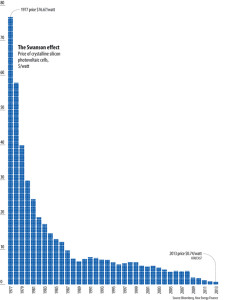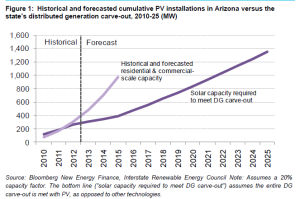from Cost of Solar

Price of solar power
Data source: Bloomberg New Energy Finance (BNEF)
Source: www.costofsolar.com
1. The average cost of solar panels has gone from $76.67/watt in 1977 to just $0.698/watt today (the second figure is according to PVinsights, and is even lower than the 2013 projected price in the chart below).
Well, that basically tells you everything you need to know right there — the cost of solar panels today is about 100 times lower than the cost of solar panels in 1977 (even more than 100 times lower!) — but I promised 10 charts, so let’s dig in even further and throw on some other fun charts and graphs. […]

